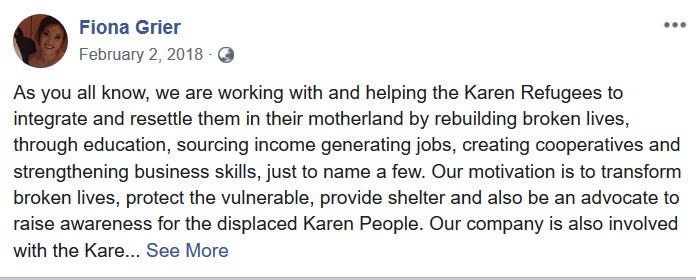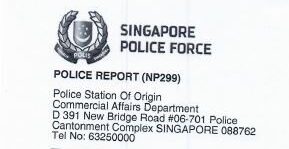Nigel Grier: Incompetent “eco-preneur” failed to deliver a single project while living a lavish lifestyle with investor’s cash
Nigel Grier sold himself as a successful sustainability entrepreneur and persuaded investors to sink US$1.5 million into environmentally friendly projects across Asia. But not one of his ventures worked out and legal investigations uncovered that Grier and his Singaporean wife spent much of the money on themselves. A previous article by the same author, which examined Grier’s business failures before the legal investigations had concluded, was published in New Naratif in November 2020.
Nigel Grier, a self-proclaimed eco-preneur, began raising funds for three projects in 2016. These projects were sold to investors as environmentally beneficial. Grier would sign letters “yours in sustainability and for the earth”.
One project, the only one where any business activity of any kind took place, was based in Bali, Indonesia, and consisted of four hotels there and one further hotel in Jakarta, the Indonesian capital. These five hotels all belonged to the Alila Hotel chain. Grier signed a contract with these hotels to provide all their waste services and to recycle as much of it as possible.
Grier also raised money for a project at Selong Selo, a luxury resort in Lombok, Indonesia. He intended to provide waste services for the resort, including water and waste water treatment, and to build solar-powered energy infrastructure on-site, but virtually nothing happened there.
The third project at Mu Aye Pu in Myanmar was somewhat different. Grier planned to build an eco-village for displaced Karen refugees, victims of the decades-long civil war in Myanmar, and provide sustainable employment opportunities for them in this new settlement. But Grier never delivered on any of his grand plans and although money was raised for this project, not so much as a brick was laid. Grier did not even purchase any land for the settlement he proposed to build.


Daniel Lobera, a Spanish national who has lived in Singapore for a decade, invested US$100,000 in Grier’s Lombok venture. Lobera recalls that Grier came to his apartment in February 2018 to present the project. “Grier seemed to know what he was talking about. He said it was a done deal, that the contract was signed. All he needed was the money to buy the equipment and scale up,” said Lobera.
In total, Grier raised US$1.5 million for the three projects. All three of them failed. So what happened and where did all the money go? An investor who pumped a large amount of money into two of these projects, and who wishes to remain anonymous, claims that a large proportion of funds raised are still to this day unaccounted for, while at least half was spent by Nigel Grier and his wife. It is estimated that between US$200,000 and US$400,000 was spent on the Bali project, which after its first 18 months of operation became a fiasco.
What went wrong in Bali?
Grier signed a contract with Alila Hotels in June 2017 to provide their waste management program. In total, he had five hotels, four in Bali and one in Jakarta. Piet Van Zyl, an engineer and sustainability expert, was already working for Alila Hotels in Bali when Grier signed the contract. “When I was working with Alila we always had a zero-waste policy. We didn’t want any waste to go to landfill or waste any water or energy. Nigel thought he could take over the waste management contract for the hotels as long as the hotels paid him whatever they paid their previous waste contractors to remove their waste,” recalls Van Zyl.
Van Zyl said that Grier set up a waste management system at each of the hotels, which consisted of two or three shipping containers where basic machinery and tools were stored. About six months after Grier signed the contract with Alila, Van Zyl resigned from his position at Alila and began working directly for Grier. Although Grier paid him less than Alila, he also gave him some bonds in the business that were meant to eventually pay a dividend.
Van Zyl acted as Grier’s sustainability officer and would travel between the five hotels making sure their waste management program was working as it should be. But after about 18 months, things started to go wrong. “At the beginning of 2019, Grier suddenly said he had cash flow problems and said he was going to move to Australia because the school for the kids in Singapore was way too expensive,” said Van Zyl.
Just before they left for Australia, Van Zyl went to meet Grier and his wife Fiona in Singapore. “I went to meet them and they said they had a bank guarantee that everybody who has bought their bonds will get their money paid out to them. That was false. When he pulled out there was no money in the business and the bank guarantee didn’t exist,” Van Zyl recalled.
Soon after this meeting Grier stopped paying Van Zyl his wages and Van Zyl resigned in March 2019. Van Zyl now realised that there was no way for Grier to make his business work, but he was still surprised it had failed so quickly as it had adequate initial investment.
“I don’t know what happened to all the money because he didn’t spend that much here in Indonesia. We spent a maximum of US$200,000 on the containers and machinery at the five hotels, then there were the salaries of the staff, and that was it,” said Van Zyl. Grier also spent US$100,000 on a deposit for a chiller for the hotel in Jakarta, which was meant to be much more energy efficient than the one they already had. But in the end, it was never delivered.
Grier’s main problem, according to Van Zyl, is that the hotels were not paying him very much. “There was very little revenue. There was no way he could make it viable with the amounts involved,” said Van Zyl. Putting aside the huge amount of investors’ money Grier and his wife spent on themselves, which no one knew about at the time, Van Zyl said Grier initially believed he could make the business work, despite the low revenues from the hotels. “He had all these schemes he was working on like selling organic waste to pig farmers, that looked like they were going to work but then fell flat,” said Van Zyl.
When Grier stopped paying his staff at the beginning of 2019, Alila Hotels were forced to pick up the tab for a couple of months just to keep the facilities going. The company then formally ended their contract with Grier and claimed all the containers and machinery for the costs they had incurred.
Bad businessman or con man?
Despite the spectacular failure of Grier’s business venture in Indonesia, Van Zyl does not think he started out from the beginning to defraud people; he was just someone incapable of delivering on his promises and of being honest to himself about the problems he faced. “I never got the impression that this was a scheme he’d cooked up. We all thought of him as a friend. But suddenly he bites back like this, I’m out of here and you’re on your own,” said Van Zyl.
However, many of the investors who trusted Grier with their cash do not share Van Zyl’s good faith in Grier’s intentions. Lobera, who lost most of his life’s savings, believes that Grier had no intention of delivering the projects and that it was a scam from the start. “I still don’t know where the money went and what it was actually used for. I’ve seen very high expenses for Nigel and his wife and I’ve seen very high salaries. So I have no doubt that it was premeditated,” said Lobera.
Investors become suspicious
Between May and June 2019, a group of investors who had funded Grier’s three projects realised that something was seriously wrong. Grier was no longer contactable and they were no longer receiving interest payments on their investments. At this point, the investors suspected that they were involved in a scam, but they couldn’t be sure. However, the events which followed left them in no doubt. Nothing had been achieved in Lombok, Myanmar or Bali, and Grier had been sent packing by Alila Hotels for breach of contract. A large amount of money was missing and over US$500,000 of investments had been spent by Grier and his wife on themselves.

The creditors meeting
In April 2020, Grier liquidated the three companies and called a creditors meeting. Normally at a creditors meeting the director meets with creditors in person and questions are raised about where the project went wrong. But because of the Covid-19 pandemic, the meeting was held via Zoom. Questions can be ignored in a Zoom meeting and those chairing it can decide who can speak and who can’t. Also, because the three companies had been incorporated in Singapore, due to the law in Singapore at the time, if the sole shareholder voluntarily puts the companies into liquidation they can choose the liquidator themselves. Grier’s wife Fiona was the only shareholder, so between them, they chose their own liquidator. According to one of the investors who was present, the liquidator obstructed the creditors’ questions.
The liquidator
Nigel Grier and his wife Fiona appointed financial consultant Ruben Potter as liquidator. It was revealed later that Potter was an unapproved liquidator. At the time unapproved liquidators were allowed to conduct voluntary liquidations, although the law in Singapore has since changed and all liquidators must now be approved.
Before, during, and after the meeting, which took place on Zoom, very little information was made available to creditors. Throughout the meeting, everybody’s microphone was turned off and although the investors had submitted written questions in advance, these were not addressed by the liquidator. Investors were told that it was not possible to recover any assets from the liquidated companies. Instead, Grier tried to persuade investors to invest in his next business venture on preferential terms. Grier’s offer was turned down by the genuine investors.
Grier also tried to blame the Covid-19 pandemic for the collapse of the companies, but the timeline didn’t fit. Covid only became an issue for tourism in February 2020, but Grier had been uncontactable for almost a year prior to the outbreak and the companies had been insolvent a long time before this, two of them soon after he had started receiving funds from investors.
Although this wasn’t provided by Potter at the creditors meeting, some of the investors found a Statement of Affairs for Grier’s companies on the ACRA (Accounting and Corporate Regulatory Authority) Singaporean government website just after the creditors meeting.
Grier gave himself and some related parties bonds in the company, thereby giving them the right to vote and outvote the genuine investors. He assumed that by doing this, it would be the end of the story and there would not be a proper investigation into what happened to investors’ money.
During the creditors meeting, Grier said that up until April 2020, there had been an offer, since withdrawn, to buy his businesses as a going concern. According to the same investor, this was almost certainly made up to try and explain why Grier hadn’t proceeded with the liquidation earlier and why he was allegedly spending creditors’ money. In fact, this claim cannot be true. Grier’s companies had huge debts and hardly any assets, a few pieces of machinery in the shipping containers at the hotels in Bali and contracts of minimal value that had since been terminated by Alila Hotels.
The creditors appoint a new liquidator
In pursuit of their lost assets, the creditors took Grier to court in 2021 and replaced Ruben Potter with another liquidator.
By early 2021 a Singapore judge ordered Potter to hand over all relevant documents relating to Grier’s companies to the lawyer acting for the investors. Grier legally had to provide these documents, but there were now glaring deficiencies between what these documents showed and what Potter had claimed in the creditor’s meeting almost a year earlier.
The documents revealed virtually no business activity from 2016–19. Not a single invoice or contract, no employee list, and no financial ledgers. Although the bank statements were incomplete, the available documents showed a high level of personal spending. Nigel and Fiona Grier had spent investors’ money meant for the three now-defunct businesses on their children’s private education, estate agents fees, flights, hotels, restaurants, and parking fines.
Grier’s balance sheet was suspect. He drew up a contract declaring S$523,000 in unpaid salaries on their Proof of Debt form to him and his wife Fiona. According to the contract he presented, Grier paid himself US$10,000 a month, and his wife S$10,000 a month over a three-year period. Grier only provided this employment contract during the investigation by the professional liquidator because he had to show it was legally legitimate to spend this money, none of the genuine investors had any idea he would claim such large salaries. Grier’s lawyer writes that Nigel and Fiona are entitled to “full reimbursement of all reasonable expenses including for entertainment, travel, and a children’s education allowance.” The Grier’s were spending investors’ money as if it was their own with the flimsy justification that that was OK because Fiona was the sole shareholder.
After the businesses had collapsed and the Griers had left Singapore for Perth in Western Australia, they continued to live a lavish lifestyle. Scott Johnson, who accompanied Grier on a trip to Bali, and who also lives in Perth, recalls that as soon as they moved into the area, the Griers rented an expensive house in a wealthy neighbourhood. “The Griers rented a two-story home with a pool in Bicton, one of the most upmarket areas of Perth,” said Johnson. The average property in Bicton sells for 1.45 million Australian dollars, while the average rental price is 490 Australian dollars a week.

Shell companies with no revenues
When the investors had successfully appointed their own liquidator, it was also revealed that from the start of receiving money from investors, Grier did not invest it in the companies it was intended for. Funds earmarked for MUP (the Bali subsidiary), IMG (Lombok) and at least some of the funds from the Mu Aye Pu venture in Myanmar were immediately wired to IDPM, Grier’s parent company in Singapore, and used as a family wallet.
While we know that Grier did provide some service to hotels in Bali for about 18 months, there was no sign of any revenues from this in any of his bank accounts that were scrutinised by the investors in 2021 and 2022. The revenues from Alila Hotels were not large and they may have been directed to another bank or legal entity entirely. What is clear is that these were not real businesses. Grier’s companies were more akin to a Ponzi scheme where funds from investors have to keep coming in to keep the business afloat, but when these dry up there are no revenues or assets and the companies become insolvent.
How Grier got away with it
Grier managed to fool investors by creating multiple legal entities, so it was not clear what business was being conducted by what company. Grier’s business ventures were in several locations — Singapore, Bali, Lombok, Jakarta, and Myanmar — while the investors were scattered around the globe. This made it harder to find out what was really going on.
It is also easy to set up companies in Singapore and the system there provides little oversight and regulation. According to one of the investors, they had little help from the Singaporean authorities and they were left to fight it out with Grier in the courts.
Many of the investors and people that did business with Grier said that he was a great salesman with a charismatic personality. However, Grier was poor on detail and appeared to have no real desire to implement any of his ideas and projects. When his venture came under scrutiny and he fled from Singapore to Australia, the investors were motivated to take legal action to uncover the truth.
An investor who wishes to remain anonymous said that if Grier had closed down the businesses in a more transparent and upfront manner, then the investors would not have funded the legal action to replace the liquidator. He also believes there is enough evidence to bring a criminal case against Grier. The investors hope that by speaking out they will prevent Grier from doing this to other people. “He [Grier] is a very clever guy in some ways. When he’s in front of you and he’s pitching ideas, he can be very convincing,” the investor said.
Despite numerous attempts to contact Grier to put these allegations to him, he did not respond.


Post Comment